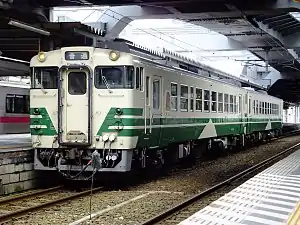Oga Line
The Oga Line (男鹿線, Oga-sen) is a railway line in Japan operated by East Japan Railway Company (JR East). It connects Oiwake Station in Akita, Akita Prefecture to Oga Station in Oga, Akita Prefecture. It is nicknamed the Oga Namahage Line (男鹿なまはげライン).
| Oga Line | |
|---|---|
 An Oga Line KiHa 40 series DMU set in September 2011 | |
| Overview | |
| Other name(s) | Oga Namahage Line |
| Native name | 男鹿線 |
| Status | In operation |
| Owner | JR East |
| Locale | Akita Prefecture |
| Termini | Oiwake Oga |
| Stations | 9 |
| Service | |
| Operator(s) | JR East |
| Rolling stock | KiHa 40 series DMU, EV-E801 series BEMU |
| History | |
| Opened | 9 November 1913 |
| Technical | |
| Line length | 26.6 km (16.5 mi) |
| Number of tracks | Entire line single tracked |
| Character | Rural |
| Track gauge | 1,067 mm (3 ft 6 in) |
| Electrification | None |
| Operating speed | 85 km/h (53 mph) |
Stations
| Station | Japanese name |
Distance (km) |
Transfers | Location | |||
|---|---|---|---|---|---|---|---|
| Oiwake | 追分 | 0.0 | Ōu Main Line | Akita | Akita Prefecture | ||
| Detohama | 出戸浜 | 5.1 | Katagami | ||||
| Kamifutada | 上二田 | 8.3 | |||||
| Futada | 二田 | 10.4 | |||||
| Tennō | 天王 | 13.2 | |||||
| Funakoshi | 船越 | 14.9 | Oga | ||||
| Wakimoto | 脇本 | 18.9 | |||||
| Hadachi | 羽立 | 23.7 | |||||
| Oga | 男鹿 | 26.6 | |||||
Rolling stock

History
The line first opened on 9 November 1913 as the Funakawa Light Railway (船川軽便線, Funakawa Keiben) from Oiwake to Futada.[1] This was extended to Wakimoto on 8 November 1914, to Hadachi on 1 December 1915, and to Funakawa (present-day Oga Station) on 16 December 1916.[1] On 2 September 1922, the line was renamed the Funakawa Line (船川線, Funakawa-sen).[1]
A freight-only branch from Funakawa to Funakawaminato was opened on 10 June 1937.[1]
On 1 April 1968, the line was renamed the Oga Line, coinciding with the renaming of Funakawa Station to Oga Station.[1]
With the privatization of Japanese National Railways (JNR) on 1 April 1987, the line came under the control of JR East.[1]
Recent developments

In spring 2017, a new EV-E801 series battery electric multiple unit train was introduced on the Oga Line service from Akita. A special recharging facility was built at Oga Station.[2]
So far, there is only one battery electric trainset operated on this line, but in December 2019 JR East announced the plan to introduce additional such trainsets on this route after the fiscal year 2020, completely replacing KiHa 40 and 48 diesel multiple units.[3]
This would make the Oga Line another non-electrified railway line in Japan where battery electric trains completely replaced diesel trains; this has already happened, for example, on the Kashii Line and the Karasuyama Line.
References
| Wikimedia Commons has media related to Oga Line. |
- Ishino, Tetsu, ed. (1998). 停車場変遷大辞典 国鉄・JR編 [Station Transition Directory - JNR/JR] (in Japanese). I. Japan: JTB. p. 110. ISBN 4-533-02980-9.
- JR東日本、男鹿線に蓄電池電車「EV-E801系」導入へ [JR East to introduce new EV-E801 series battery train on Oga Line]. Response (in Japanese). Japan: IID, Inc. 20 November 2015. Retrieved 21 November 2015.
- "男鹿線へ交流蓄電池電車ACCUM「EV-E801系」を追加投入します" (PDF) (Press release). JR東日本秋田支社. 3 December 2019. Retrieved 9 December 2019.
.svg.png.webp)
